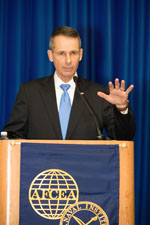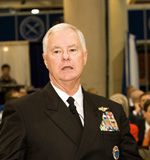Quote of the Day “We are playing this game on their 5-yard line, not ours—and we need to keep it there."—Gen. Peter Pace, USMC (Ret.), former chairman of the Joint Chiefs of Staff, on the Global War on Terrorism
WEST 2008 Online Show Daily
Day 1
By Robert K. Ackerman
 |
| Former Joint Chiefs of Staff Chairman Gen. Peter Pace, USMC (Ret.), gives the kickoff address at West 2008. |
Success in the Global War on Terrorism will require effective use of all government and industry resources available to the United States, not just dominant military power—that from the onetime highest-ranking officer in the U.S. military.
Gen. Peter Pace, USMC (Ret.), former chairman of the Joint Chiefs of Staff, emphasized that brute force alone will not be enough to defeat the terrorists. All elements of government—the State Department and the Treasury Department, to name two—must be brought into play where their expertise can help shut down terrorist gains.
Iraq was one key topic, but many other military challenges were discussed at West 2008, the annual conference and exposition sponsored by AFCEA International and the U.S. Naval Institute. Held February 5-7 in San Diego, California, the conference examined the topic “U.S. at a Crossroads: Where—and How—After Iraq?”
Gen. Pace’s kickoff address at West 2008 followed that theme. Regarding the Iraq War, he declared that by any measure the recent surge has been militarily successful. However, even though the evidence is strong—attacks on coalition forces and the Iraqi people are down—people should not focus on those facts alone. Numbers can change, and using that kind of metric cedes to the enemy the determination of whether the allies are winning or losing.
Instead, success should be measured by how the Iraqi people feel about their lives today and in the future. Achieving that success will require the kind of broad-based effort he described earlier.
 |
A panel headed by Vice Adm. Al Konetzni, USN (Ret.), (r) floats ideas on how to fight an unconventional war. Other panelists include (r to l) Cmdr. Mike Horan, USN, former commander, Joint Provincial Reconstruction Team, Farah, Afghanistan; Lt. Cdr. Joel Lang, USN, former commanding officer, USS Typhoon in Iraq riverine operations; Capt. Robert Kapcio, USN, USNS Comfort mission commander; and Capt. C.J. Kalb, USN, former civil military affairs and effects director for Combined Forces Command, Afghanistan. |
But the United States must strive harder to understand its allies points of view, he added. U.S. forces view their involvement in Afghanistan as part of homeland defense, while many other allies view their service there as assistance to a struggling country. The result of this different outlook is unity of command but not of intent, and the United States must sit down with its friends and engage them in dialogue.
The general admitted that he is very concerned about cybersecurity in this information age. The nation is extremely vulnerable to cyberattack, he warned, in large part because of its heavy reliance on computer systems and networks. Those individuals who know enough about the threat to understand its danger cannot share that information with others, which hinders security measures. The federal government must establish standards for industry to spend money on security, he warranted.
And the threat is only going to get worse. Right now, only nation-states have the computing capability to wage damaging cyberattacks on the United States. But just as computing advances increased geometrically over the past two decades, more damaging cyberwarfare capabilities are likely to creep down to the smaller computers and their users—who might well be a small group of terrorists, or even an individual.
Some of those potential adversaries can be found in the Asia-Pacific region, which is the largest area of operation for the U.S. Military. Adm. Timothy J. Keating, USN, commander of the U.S. Pacific Command, told a luncheon how the partnerships the United States is building throughout that region are paying dividends both for international security and for the Global War on Terrorism.
 |
Adm. Timothy J. Keating, USN, commander of the U.S. Pacific Command, wades into Tuesday’s luncheon crowd as he reviews the challenges facing the command’s vast area of operation. |
The People’s Republic of China is a major point of interest, and Adm. Keating described recent efforts to open communications channels with high-ranking Chinese officials. A visit in May was “not entirely fulfilling,” but a return this winter produced some small progress. Still, relations between the two nations have “miles to go before we sleep” he said, quoting poet Robert Frost.
China just is not transparent enough, he continued. Among the issues between the two countries are China’s development of area denial weapons, its antisatellite test and its continuing work on asymmetric warfare. China also is working on what it calls “informationization,” Adm. Keating observed, and he questioned why China is doing so much in that arena.
Commenting on a recent court ruling limiting the Navy’s ability to train using active sonar, Adm. Keating warned that “our ability to find and fix any submarine in the Pacific is not as robust as it should be.” The Navy needs to train on active sonar, he stated, adding that if it cannot use the equipment properly, it could end up fighting with one hand tied behind its back—which probably would cost American lives. “We don’t want that, and we don’t want a fair fight. We need active sonar,” he declared.
 |
| An afternoon panel discusses how to accelerate information technology to the fleet. Panelists are (r to l) moderator Robert J. Carey, Department of the Navy chief information officer; Brig. Gen. George J. Allen, USMC, director, C4 and chief information officer, U.S. Marine Corps; Vice Adm. H. Denby Starling II, USN, commander, Naval Network Warfare Command; Rear Adm. William D. Rodriguez, USN, chief engineer, SPAWAR; Rear Adm. Timothy V. Flynn III, USN, program executive officer, Enterprise Information Systems; and Kevin Cooley, director of information technology and information resource management, U.S. Navy, OPNAV N61. |
Full coverage of West 2008 can be read in the April 2008 issue of SIGNAL Magazine.




Comments